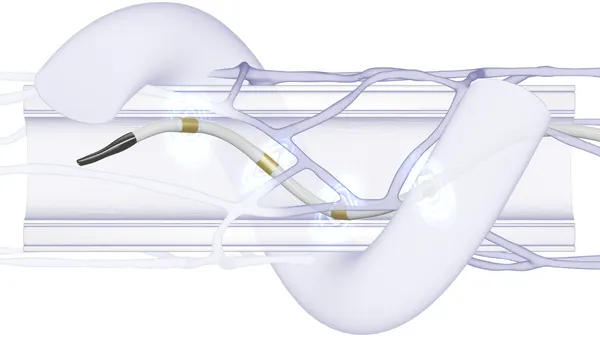Dive Brief:
- The U.K.'s Medicines and Healthcare products Regulatory Agency on Monday posted a field safety notice announcing updates to instructions for use of paclitaxel‐coated balloons and stents throughout Europe to include a warning and summary of a meta-analysis on risk of death with the devices.
- MHRA called out 12 affected paclitaxel-coated balloons and paclitaxel-eluting stents in Europe including Boston Scientific's ELUVIA stent, Cook Medical's Zilver PTX stent, and Medtronic's IN.PACT Admiral balloon.
- The U.K. regulator told healthcare providers that the instructions for the balloons and stents used in the treatment of peripheral arterial disease of the lower limbs will include information on a December 2018 meta-analysis that reported an increased risk of death at two and five years following the application of paclitaxel‐coated devices in the femoropopliteal artery. Device manufacturers rolled out similar label changes in the U.S.
Dive Insight:
Safety of paclitaxel-coated balloons and paclitaxel-eluting stents was called into question after the late 2018 publication of a meta-analysis reporting an increased risk of death following the application of such devices in the femoropopliteal artery of the lower limbs.
While no products are being recalled and the indications and contraindications of the devices remain unchanged, the British regulatory agency said physicians "should discuss this late mortality signal and the benefits and risks of available treatment options with their patients."
Monday's field safety notice also noted that regulators in France previously requested all medical device manufacturers add a warning and clinical summary of the meta-analysis to European instructions.
U.S. regulators made a similar recommendation last year. Following a two-day meeting in June 2019, FDA's Circulatory System Devices Panel Advisory Committee recommended that while paclitaxel-coated balloons and paclitaxel-eluting stents should remain on the market, new labeling should be put into place warning physicians and patients of a potential long-term mortality signal to inform decision-making.
Medtechs that make the affected devices insist the safety profile of the balloons and stents outweigh the risks. This assertion got a boost in January from the publication of a retrospective study utilizing German health insurance claims which found patients treated with a paclitaxel-coated device for chronic limb threatening ischaemia and intermittent claudication had higher long-term survival, freedom from major cardiovascular events and better amputation-free survival than a control group that received uncoated devices.
While Monday's notice acknowledged "uncertainty" regarding the increased late mortality risk from paclitaxel-coated devices as well as limitations in the available data, the agency concluded the benefits of these balloons and stents should be considered in individual patients along with potential risks.
"It is also important to remember that health professionals should inform patients and their follow-up physicians of the nature of the devices used during the procedure," the MHRA notice said, going on to say that European instructions for the paclitaxel-coated balloons and stents will not only include a warning and a summary of the meta-analysis but will also be supplemented with clinical data specific to each device.













